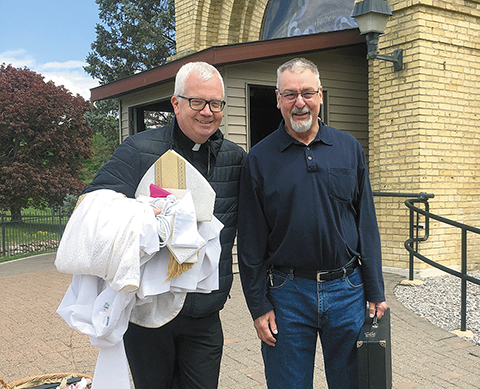
Over a 13-month period from September 2021 to November 2023, Bishop Donald J. Hying of Madison personally attended rural listening sessions in the 11 counties of the diocese.
At the request and with the advice of the bishop, Tom Nelson, coordinator of the diocesan rural life office, facilitated the sessions.
Nelson, who lives in rural Green County, said the bishop’s attendance and careful listening contributed to the success of the information gathering.
Nelson said the rural listening sessions tied into the Into the Deep strategic planning process.
“The bishop initiated this extensive process of a deep dive into the current services and ministries of our parishes and our entire diocese, knowing that our current situation is simply not sustainable in the longer view of the Diocese of Madison.”
Message of hope
Focusing on the bishop’s message of hope, Nelson said, “Just as our Bishop has implored through this entire Into the Deep process, we must ‘Trust in the Lord with all our heart and never forget we are a people of hope,’ which is the cornerstone of our faith foundation.”
The diocese encompasses 8,070 square miles in 11 counties. Outside of Madison, Beloit, and Janesville, the diocese is rural.
Shortly after he was installed as the bishop of Madison, Bishop Hying announced the reinstatement of the diocesan rural life office.
Soon after, in his weekly column, he wrote, “My hope is to reinstitute the practice of Rural Life Days in the diocese, spend more time in our smaller communities with a focus on listening to the needs and challenges of today, and to respond with practical help. How do we offer spiritual support, access to existing services, and advocate for sustainable family farms?”
The bishop continued, “Our local Church is small towns and farms. I love that. My father grew up on farms in Iowa and Grant counties, and some of my fondest memories are visiting my grandparents’ farm near Highland when I was a child.”
Gifts and challenges
As Nelson and the bishop traveled the diocese, they heard from hundreds of parishioners.
As facilitator, Nelson asked each county gathering to identify the concerns and issues which impact daily life within their farming communities: the gifts of what we already have and are grateful for and the challenges we face to sustain one another in the work of human hands, the growing of our daily bread.
Uniformly, parishioners expressed their gratitude for their parish communities, said Nelson. “The gifts listed in most of the communities centered around our parish, our priests, and the strong support of an active culture of parish volunteers.”
Those parishes that had a Catholic school within the area were especially grateful.
In his summary report, Nelson wrote, “The support of Catholic education was celebrated and cherished as a vital function we must sustain and prosper.”
Another gift, continued Nelson, is “rural life and the heartland each farming family is tapped to cultivate and to steward also was regularly recognized as a demanding but awesome call to the land of our fathers. Our head shepherd’s humility was also tested as each rural community praised our bishop for his continued and regular presence within their parishes, no matter how far from Madison.”
Many of the challenges stated flowed partly from the list of gifts, said Nelson.
They include declining family sizes and the youth exodus from rural towns for education and employment, lack of such family support services as child and elder care (especially during busy seasons of planting and harvesting), limited rural hospital staff, and concern for the very stressful nature of farming itself.
Dealing with stresses
Nelson said, “On a good day farming is dangerous, and adding the stress of work safety, unpredictable weather, dwindling financial options, and a fickle world market can lead the healthiest and calmest among us to become over-stressed and at our limit of physical, mental, and spiritual endurance.”
In almost all the sessions, rural resiliency, or lack of it, was a major concern and is, therefore, a concern of the bishop, said Nelson.
“Diocesan Catholic Charities and the Apostolate for Persons with Disabilities are exploring potential service opportunities to help in educating parish communities to better support struggling members within our churches — whatever the challenges they face.”
As a result of the listening sessions, five priorities emerged which address adult formation, youth engagement, parish staff, resiliency, and extending and expanding resources.
They are:
- Counseling and extensive services for individuals, families, and communities at repurposed parish sites throughout the diocese
- Keeping youth in our rural communities and engaging the youth in the respective pastorates
- Adult faith formation by pastorates
- Be a resource organizer and distributor of services
- Full-time staff for pastorates in rural areas
Under the leadership of Bishop Hying, the pastorate clergy teams, the Rural Life Advisory Group, the rural life coordinator, and diocesan leadership, these five rural life priorities will be explored and developed more fully through the Into the Deep process.
A four-page summary of the listening sessions is available for viewing on the Diocese of Madison website at madisondiocese.org

